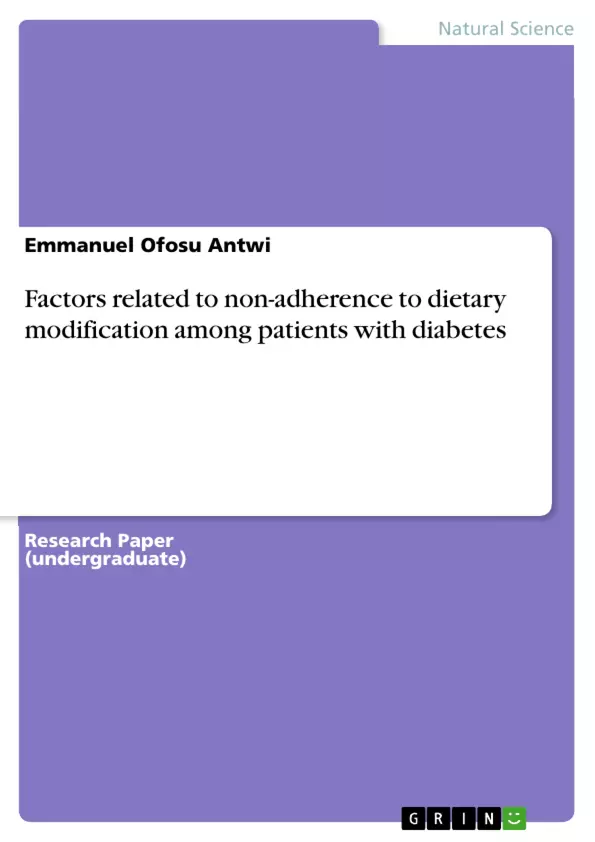This study assessed factors related to non-adherence to dietary modification among patients with diabetes attending clinic at Holy Family Hospital, Nkawkaw.
Diabetes is one of the most rapidly increasing non communicable diseases which has emerged as a public health concern across the world. Adherence to recommended dietary practices for patients with diabetes is very critical to achieve optimal metabolic control, as non-adherence is associated with adverse effects, which eventually lead to major complications. The study was a descriptive cross-sectional study, and had a sample size of 100 respondents. Data was analyzed using SPSS version 20. The study results revealed that the participants possessed a reasonably good level of knowledge regarding dietary management.
Participants showed a sound understanding on the various major nutrients in foods, and were aware that skipping dietary management prescribed by health experts may not help their condition, were aware of the effect of foods on blood glucose. Also, most of them knew that brown sugar is a healthy alternative to white sugar, were knowledgeable on the levels of sugar in foods, and had good knowledge on foods which helps in proper management of blood glucose. The study results revealed that the participants demonstrated good dietary practices in dietary management. Some of the dietary practices included taking their main meals thrice in a day, most of them eating their first meal between 7am to 8 O’clock, eating more of vegetables and fruits and consuming less starchy, sugary, fatty and salty foods. The findings of this study also revealed that, factors such as individual preferences, lack of adequate information on healthy diet, difficulty to change existing meals, occupation and busy schedule, limited food choices, frequent social gathering, inability to afford recommended diet, inadequate and accuracy of dietary advice and poor awareness to dietary management hindered adherence to dietary modifications among patients with diabetes.
Inhaltsverzeichnis (Table of Contents)
- Abstract
- Dedication
- Acknowledgement
- Chapter 1: Introduction
- Background of the Study
- Statement of the Problem
- Purpose of the Study
- Research Questions
- Objectives of the Study
- Significance of the Study
- Scope of the Study
- Definition of Terms
- Chapter 2: Literature Review
- Concept of Diabetes Mellitus
- Types of Diabetes Mellitus
- Causes of Diabetes Mellitus
- Complications of Diabetes Mellitus
- Dietary Management of Diabetes Mellitus
- Factors Influencing Adherence to Dietary Modification
- Adherence to Dietary Management
- Chapter 3: Research Methodology
- Research Design
- Study Area
- Population and Sample Size
- Sampling Techniques
- Data Collection Methods
- Data Analysis Methods
- Ethical Considerations
- Chapter 4: Results and Discussion
- Socio-demographic Characteristics of the Respondents
- Knowledge of Participants on Dietary Management of Diabetes
- Dietary Practices of Participants
- Factors Influencing Adherence to Dietary Modification
- Chapter 5: Conclusion and Recommendations
Zielsetzung und Themenschwerpunkte (Objectives and Key Themes)
The study aimed to assess the factors related to non-adherence to dietary modification among patients with diabetes mellitus attending a clinic at Holy Family Hospital in Nkawkaw, Ghana. The study used a descriptive cross-sectional design with a sample size of 100 respondents. Data was collected through questionnaires and analyzed using SPSS version 20.
- Dietary management of diabetes mellitus
- Factors influencing adherence to dietary modifications
- Knowledge and practices of patients with diabetes
- Impact of non-adherence on patient outcomes
- Strategies to improve adherence to dietary management
Zusammenfassung der Kapitel (Chapter Summaries)
Chapter 1: Introduction This chapter provides the background of the study, highlighting the prevalence and importance of diabetes mellitus as a global health concern. It also outlines the research problem, purpose, research questions, objectives, significance, scope, and defines key terms related to the study.
Chapter 2: Literature Review This chapter provides a comprehensive overview of the existing research on diabetes mellitus, its management, and the factors influencing adherence to dietary modifications. It explores the concept, types, causes, and complications of diabetes mellitus. It also discusses different approaches to dietary management and explores factors affecting adherence, such as individual preferences, knowledge gaps, and social influences.
Chapter 3: Research Methodology This chapter outlines the research design, study area, population, sample size, sampling techniques, data collection methods, data analysis methods, and ethical considerations employed in the study. It provides a detailed explanation of the methodology used to conduct the research and ensure the validity and reliability of the findings.
Chapter 4: Results and Discussion This chapter presents the findings of the study, analyzing the socio-demographic characteristics of the respondents, their knowledge of dietary management, their dietary practices, and the factors influencing adherence to dietary modifications. The chapter provides a detailed discussion of the results, comparing them with existing literature and highlighting the implications of the findings.
Schlüsselwörter (Keywords)
The main keywords and focus topics of this study include: diabetes mellitus, dietary modification, non-adherence, factors influencing adherence, knowledge, practices, patients, healthcare, Ghana, Holy Family Hospital, Nkawkaw.
- Quote paper
- Emmanuel Ofosu Antwi (Author), 2023, Factors related to non-adherence to dietary modification among patients with diabetes, Munich, GRIN Verlag, https://www.hausarbeiten.de/document/1436562


